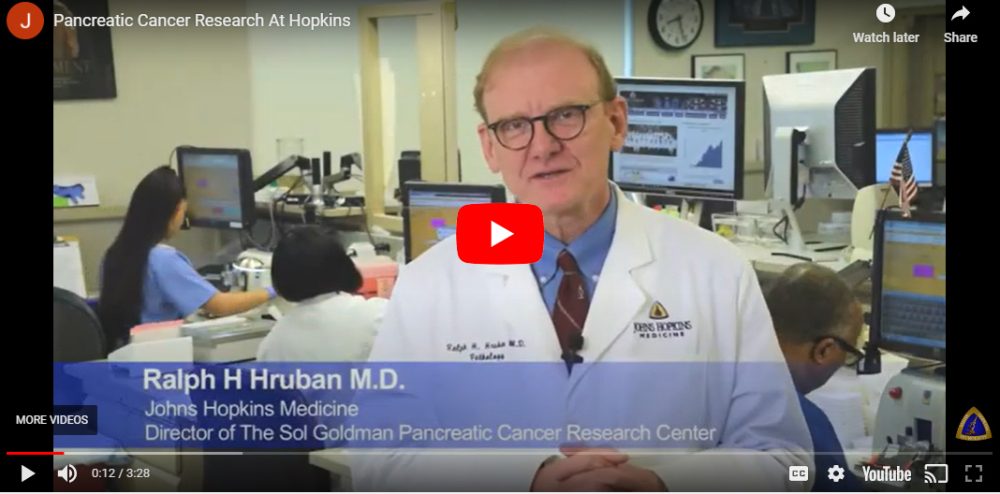Private giving has real impact. It allows us to make significant advances in our understanding of pancreatic cancer and it provides critical support for our scientists.
How Can You Help?
Gifts of all sizes help the Sol Goldman Center lead the world in groundbreaking pancreatic cancer research. Thank you for your support!
Donate Online ▼

To make a gift or pledge online, please complete our secure online giving form.
Donate by Phone ▼

To speak to someone directly about making a gift, please call 443-287-7949.
Donate by Mail ▼

Mail your tax-deductible contribution made payable to Johns Hopkins University to:
Pancreatic Cancer Research
Department of Pathology
Johns Hopkins Medicine
550 North Broadway / Suite 701B
Baltimore, MD 21205
Pancreatic cancer is often diagnosed at a late, advanced stage, after the cancer has spread to other organs and is no longer curable. The team at Johns Hopkins has identified and characterized curable precancerous lesions in the pancreas—offering a target for early detection.
Pancreatic cancer is, in essence, a disease caused by DNA changes (mutations) in cells in the pancreas. The team at Johns Hopkins was the first to sequence (read) all of the genes in pancreatic cancer. In so doing, the team at Hopkins defined the genetic drivers of pancreatic cancer and discovered new therapeutic targets.
Just as we inherit our eye and hair color from our parents, so too some people inherit an increased risk of developing pancreatic cancer. The team at Johns Hopkins was the first to sequence (read) all of the genes inherited in patients with familial pancreatic cancer, and the team has discovered many of the genes (DNA changes) that cause pancreatic cancer to run in families.
Pancreatic cancer is often diagnosed at a late, advanced stage, after the cancer has spread to other organs and is no longer curable. The team at Johns Hopkins has made significant strides towards the development of an early detection test. The test, which detects abnormal DNA shed by pancreatic cancer into the blood, is currently being tested clinically.
Pancreatic cancer surgery is extremely difficult and, in past decades, used to be associated with very high mortality rate. The surgical team at Johns Hopkins does more pancreatic cancer surgeries than any other center, and thanks to advances made by this team, the mortality rate from surgery has dropped to less than 2%.
Pancreatic cancer is a complicated disease, and treating it requires team work. The team at Johns Hopkins established the largest and most successful multi-disciplinary clinic for patients with pancreatic cancer.
Pancreatic cancer research is complicated and requires team work. The team at Johns Hopkins has been awarded the Team Science Award by the American Association for Cancer Research (three times!!).
Additional Ways to Give
Some people give donations directly, some leave money to Johns Hopkins as a bequest, and some ask that donations be sent in lieu of flowers. Each donation helps us explore new avenues of research, and each is a poignant reminder of the human cost of this disease.
Honor Gifts ▼
Giving a donation in honor of someone whose life and accomplishments you wish to celebrate is a beautiful and meaningful way to honor them. Your gift both honors a loved one and strikes a blow against a terrible disease. This is also an excellent way to celebrate a birthday, anniversary, wedding or retirement with a gift in their honor.
In Lieu of Flowers ▼

We receive a number of donations in lieu of flowers. This is a wonderful way to both honor a loved one and to help fight this terrible disease. These donations are made at very difficult times, and we therefore want to simplify the process. If you have lost a loved one and would like donations sent to Hopkins to help battle this disease in their memory, please:
- Make donations payable to: Johns Hopkins University
- Indicate on the memo line of the check the name of the individual in whose memory the donation is being made.
- Mail the donation to:
Ralph H. Hruban, M.D.
Johns Hopkins Hospital
600 N. Wolfe Street, Carnegie 417
Baltimore, MD 21287
Endowments ▼
Create a Named Endowment for Pancreatic Cancer Research
Research requires money, and private philanthropy provides a margin of excellence to our research. Private funds are flexible and can be deployed quickly to take advantage of new ideas and new people. Private funds are particularly needed to support research on pancreatic cancer. This is because pancreatic cancer research is woefully underfunded by the Federal Government (the NIH).
Endowments are wonderful ways to honor a loved one. Once established, the principal of the endowment is invested by the University. A portion of the income generated each year is reinvested to insure the long-term growth of the Endowment. The remainder of the income generated is given to the scientists to support their research.
Research endowments start at $100,000 which can be pledged and paid over a three to five year period. When an endowment is created a plaque is placed in the research labs honoring the donor.
Create an Endowed Chair (professorship) for Pancreatic Cancer Research
"Everything that is really great and inspiring is created by the individual who can labor in freedom"
Albert Einstein
The establishment of an endowed chair ("professorship") for pancreatic cancer research allows a leading scientist to pursue high-impact research work. This work has the potential to advance the field by leaps and bounds. All to often, scientists focus their efforts on "evolutionary" work because it is safer, and more of a sure bet. Endowed chairs allow scientists such to pursue revolutionary work. In addition named chairs are a wonderful way of permanently honoring the donor.
The cost for a named endowed chair is $2.8 million.
Endowed Fellowship: New Technologies in Pancreatic Cancer Research
"The principal mark of genius is not perfection, but originality, the opening of new frontiers."
Arthur Koestler
Trainees must make critical decisions when they come to the end of their standard training. They must decide whether or not to pursue a career in research. Countless trainees with enormous potential have chosen not pursue a research career because of a lack of a secure fellowship program.
At the same time, young minds are the most creative minds. Human creativity peaks at a rather young age; as our fund of knowledge increases our creativity paradoxically decreases. Indeed, some of the major new ideas in cancer research in the last several years have come from young scientists in their training. For example, Victor Velculescu here at Johns Hopkins created the idea for the revolutionary technology of serial analysis of gene expression (SAGE). Victor did this while he was a post-doctoral student in the Johns Hopkins cancer research laboratories.
We propose to create an endowed fellowship training program in pancreatic cancer research at Hopkins. This endowment will provide secured funding to young scientists and physicians wishing to pursue a career in pancreatic cancer research. The research fellowship will take advantage of and most importantly encourage the creativity of the trainees. The fellow will be given protected time to focus on identifying and creating new technologies which can be applied to pancreatic cancer research.
This approach will bring more minds to the battle against pancreatic cancer. Furthermore, the focus on creative spark will mean that our understanding will advance not in safe yet small steps, but rather in daring leaps.
| What You Sponsor | Cost |
|---|---|
| 1 Fellow (1 year X $50,000/year) | $50,000 |
| 1 Fellow (2 years X $50,000/year) | $100,000 (most Fellowships last 2 years) |
| Endowed Fellowship | $1,700,000 |
Planned Giving ▼
A number of people have asked how they can make a bequest and about other forms of planned giving. Planned giving can be a wonderful way to support pancreatic cancer research. Depending on the arrangements you choose you can also:
- Reduce your income taxes
- Get more favorable capital gains tax treatment
- Increase your spendable income
- Retain payments for life
- Achieve no-cost, worry-free asset management
To learn more about planned giving opportunities visit Gift Planning at Johns Hopkins or contact the development office at 443-287-7949 or [email protected].
Special Fundraisers ▼
There have been special events organized by family members of those afflicted with pancreas cancer to raise money for pancreatic research at Hopkins.
Early visitors to our discussion board organized a major fundraising event, "Evening with the Stars", which raised over $100,000 to assist in starting a new laboratory at Johns Hopkins. Now, a number of families—including the Rolfe, Zgonina and Monastra families—have organized fundraisers to benefit our pancreatic cancer research program.
Start a FundraiserWhat Your Donation Buys
A number of you have asked us to spell out exactly where these donations go. We do not use the donations to support fundraising or other administrative efforts. Instead, 80% of each donation goes directly to support pancreatic cancer science—particularly our young investigators—and our educational efforts. These young investigators have wonderful creative ideas and they are at a point in their careers at which private giving can help convince them to join the battle against pancreatic cancer. The remaining 20% of your donation supports the Johns Hopkins Medicine Clinical and Academic Fund. In turn, Johns Hopkins Medicine provides infrastructure support to the pancreatic cancer research labs- the lighting, the heating for the building, etc.
Every donation makes a difference. Here's what your donation—large or small—can do to help.
| Donation | Research Supplies |
|---|---|
| $10 | One human gene contained within a cloning vector |
| $20 | Reagents needed to isolate DNA from a patients' blood sample |
| $30 | A pair of PCR primers used to amplify one gene |
| $35 | Vials for freezing tumor samples |
| $40 | Enzyme to precisely cut DNA |
| $60 | Enzyme to join DNA fragments |
| $100 | Tumor cell line |
| $100 | A vial of enzyme to modify or amplify DNA |
| $150 | DNA purification kit |
| $400 | Enzyme to amplify DNA from tumors |
| $500 | DNA fragments to study a new gene |
| $700 | Lab refrigerator used in ongoing experiments |
| $900 | Set of pipettes to measure chemical solutions |
| $2,700 | Incubator for tumor cell culture |
| $5,000 | Lab freezer |
| $7,000 | Centrifuge for drug screens and purifications |
| $9,000 | PCR machine to amplify DNA |
| $50,000/yr | Research fellow and supplies |
| $100,000 and up | Named research endowment |
| $1.7 million | Named endowed research fellowship |
| $2.8 million | Named endowed professorship for pancreas cancer research |





